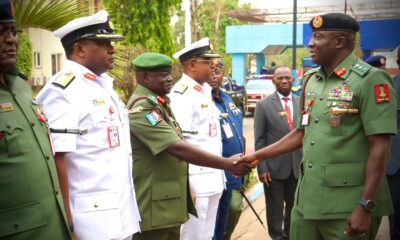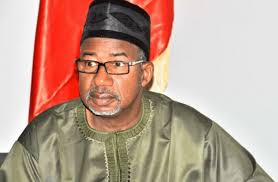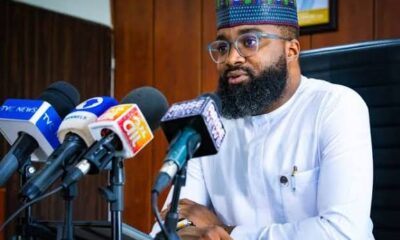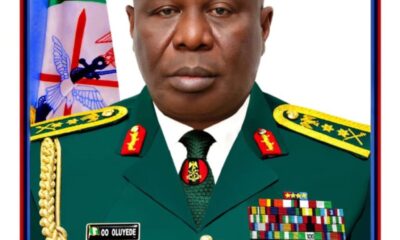Foreign News
Key Takeaways from the Second Russia-Africa Summit

By Jideofor Adibe
The Second Russo-Africa Summit, which was originally scheduled to hold at the African Union headquarters in Addis Ababa, Ethiopia, on October 2022, was eventually held at the Expo Forum in St. Petersburg, Russia’s second largest city after Moscow, on 27 and 28 of July 2023.
The original idea of holding it in Addis Ababa was partly in response to criticisms of African leaders being herded into one European or American capital in the name of Africa Summit – like small boys. However, given what has happened in the last couple of years, what are the main takeaways from the Summit?One, that the summit held at all was a subtle message that life in Russia remains normal despite the Ukrainian war and the Western sanctions on the country.
Though attended by 49 delegations, with only 17 heads of state participating at the summit compared with the 43 which previously attended the first summit in 2019, it must be underlined that not many people would feel comfortable visiting a country at war. Add to this the rumour that the US and other European countries mounted serious pressure on African leaders not to attend the Summit and the attendance will be seen as not too bad. Besides, some of the continent’s most important leaders were there. They included Abdel Fattah el –Sisi of Egypt, Cyril Ramaphosa of South Africa, Macky Saul of Senegal and Isaias Afwerki of Eritrea. Other prominent attendees included Moussa Faki Mahamat, Chairperson of the African Union Commission, Workneh Gebeyehu Negewo, Executive Secretary of the Intergovernmental Authority on Development (IGAD), Amina Salmane, Permanent Representative of the Arab Maghreb Union to the African Union, Dilma Rousseff, BRICS New Development Bank President, Benedict Oramah, President of African Export–Import Bank (Afreximbank) and Gilberto Da Piedade Verissimo, President of the Economic Community of Central African States. Though the Nigerian President Bola Ahmed Tinubu was not there, he was represented by the country’s Vice President, Kashim ShettimaTwo, it is symbolic that the Summit was attended by Yevgeny Prigozhin, the founder and leader of the Russian private military contractor, Wagner group. It was Prigozhin’s first known public appearance in Russia since launching an unsuccessful armed rebellion against the country’s military hierarchy. Though Private military companies (PMCs) are banned in Russia, Wagner, has since 2014 (when Russia annexed Crimea), emerged as one of Russia’s most important foreign policy tools in several African countries. Capitalizing on anti-Western and anti-French sentiments, the Wagner group has bolstered its presence in Central African Republic, Libya, Mali and Sudan and looking for opportunities to extend its influence to other places. The group has been operating in several African countries since 2017, often providing its clients with direct military support and related security services alongside propaganda efforts. It was estimated that in 2018 about 1000 Wagner mercenaries entered CAR to defend the government of President Faustin-Archange Touadéra against rebel attacks on the capital, Bangui. In return, Wagner subsidiaries received unrestricted logging rights and control of the lucrative Ndassima gold mine. The presence of Prigozhin at such a high level summit will indicate both tacit Russian support for Wagner’s operations as well as Prigozhin’s interest in exploring opportunities for further expansion in Africa.
Three, the summit provided an opportunity for Putin to make amends on his alleged shabby treatment of African leaders who had met with him to promote its peace plan for the war in Ukraine. It should be recalled that on May 16 2023, South Africa’s president Cyril Ramaphosa, announced new initiatives by African leaders for peace in Ukraine. In June 2023, the African peace mission, including representatives from South Africa, Egypt, Senegal, Congo-Brazzaville, Comoros, Zambia and Uganda visited both Ukraine and Russia to promote its peace deal. On 17 June, Ramaphosa and his delegation met the Russian President Vladmiri Putin at St. Petersburg. The delegation reportedly called on Putin to end the Russian invasion of Ukraine but Putin was said to have rejected the peace plan because it was allegedly based on Russia accepting Ukraine’s internationally recognized borders. Some have in fact argued that Putin treated the African leaders with disdain and disrespect. A South African Professor William Gumede, was for instance quoted as saying that the fact that Kyiv was bombed during the visit of the African peace mission to Ukraine was humiliating “and then in Russia, Putin didn’t even bother to listen to the delegation, basically interrupting them before they’d even finished speaking, implying there was no point in discussing anything as the war would continue.” Perhaps what was often left out by critics of Russia’s treatment of the African delegation was that the time of the peace mission was probably inauspicious because Ukraine had just launched its much anticipated counter offensive to reclaim lost territories. Be that as it may, the Second Summit was an opportunity for Putin to make amends and Putin was mostly on charm offensive. Commenting on the African peace initiative, Putin was quoted as saying: “We did not reject them”, but only maintained that “in order for this process to begin, there needs to be agreement on both sides.”
Four, alongside the war in Ukraine, food security was high on the agenda especially following Russia’s decision to withdraw from an international grain deal. The agreement brokered by the United Nations and Turkey last year allowed the safe passage of agricultural goods through Ukraine’s ports in the Black Sea. While the vast majority of the nearly 33 million tonnes exported since then did not reach the world’s poorest countries, the deal was said to have helped reverse spiralling food prices by more than 20 percent, according to the UN. Russia justified its decision to withdraw from the grains deal by arguing that the conditions for the extension of the Black Sea Grain Initiative had been ignored. Korir Sing’Oei, Kenya’s principal secretary for foreign affairs, called Putin’s decision to pull out of the grain deal “a stab on the back”.
As if in response to the charge of stabbing them on the back, Putin told African leaders he would gift them tens of thousands of tons of grain despite Western sanctions, which he said made it harder for Moscow to export its grain and fertilisers. He was quoted as saying that Russia was ready to replace Ukrainian grain exports to Africa on both a commercial and aid basis to fulfil what he said was Moscow’s critical role in global food security. Russia said that Ukraine’s failure to export more grain to poorer countries was one of the reasons it pulled out of the deal. Putin also complained that parts of the deal allowing for the export of Russian food and fertilisers had not been honoured.
On charges of insensitivity to millions of poor in drought-hit horn of Africa, Putin was quoted as saying: “We will be ready to provide Burkina Faso, Zimbabwe, Mali, Somalia, Central African Republic and Eritrea with 25-50,000 tonnes of free grain each in the next three to four months.” Last year, Russia exported 60 million tonnes of grain, of which 48 million was wheat.
Five, the Summit also agreed to institutionalise Russo –Africa relations by establishing a Russia-Africa Partnership Forum with a view to coordinating the development of the Russian-African relations. It designated the Russia–Africa Summit as its supreme body to be convened once every three years. It also proposed an annual political consultation between Ministers of Foreign Affairs of the Russian Federation and African States.
Six, the Summit also re-stated its commitment to enthrone a multipolar world order. Putin hailed the “commitment of all our states to the formation of a just and democratic multipolar world order”. The Participants at the Summit also signed a joint declaration that called for “the establishment of a more just, balanced and stable multipolar world order, firmly opposing all types of international confrontation in the African continent.” Putin promised that Russia would support African countries’ efforts to “ensure compensation for colonial policies, including the restitution of cultural property displaced in the process of colonial plundering.”
Jideofor Adibe is a professor of Political Science and International Relations at Nasarawa State University, Keffi and Extraordinary Professor of Government Studies at North Western University, Mafikeng South Africa. He is also the founder of Adonis & Abbey Publishers and can be reached at 0705 807 8841 (Text or WhatsApp only).
Foreign News
Trump Threatens to Sue Comedian Trevor Noah over Grammys Epstein Joke

U.S. President Donald Trump has threatened to sue Grammys host, Trevor Noah after a joke he made about disgraced financier Jeffrey Epstein on stage.
Trump blasted the comedian as a “total loser,” adding: “It looks like I’ll be sending my lawyers to sue this poor, pathetic, talentless, dope of an M.
C., and suing him for plenty of dollars. ”Trump criticised Noah’s joke, made after the song of the year gong was handed out at the ceremony on Sunday night.
Writing on Truth Social, in a post strewn with uppercase words, Trump said: “Noah said, INCORRECTLY about me, that Donald Trump and Bill Clinton spent time on Epstein Island. WRONG!!!
“I can’t speak for Bill, but I have never been to Epstein Island, nor anywhere close, and until tonight’s false and defamatory statement, have never been accused of being there, not even by the Fake News Media.
“Noah, a total loser, better get his facts straight, and get them straight fast.”
He added: “Get ready Noah, I’m going to have some fun with you!”
Trump also blasted the ceremony saying: “The Grammy Awards are the WORST, virtually unwatchable! CBS is lucky not to have this garbage litter their airwaves any longer.”
This was an apparent reference to Disney taking over the broadcast rights for the award ceremony starting in 2027.
He has also engaged in legal action with the New York Times, Associated Press and the Wall Street Journal.
Last July, U.S. media giant Paramount, which owns CBS, agreed to pay Trump 16 million dollars to settle a lawsuit over a 2024 CBS interview with Kamala Harris, the former vice-president and 2024 Democratic presidential nominee.
Noah, 41, is a South African-born comedian and TV personality who hosted “The Daily Show” on Comedy Central in the U.S. for seven years.
Foreign News
Measles Cases Spike to 13,989 in Mongolia

Mongolia National Center for Communicable Diseases (NCCD) on Tuesday announced that 22 new cases of measles infection have been registered over the past 24 hours, bringing the national caseload to 13,989.
The NCCD said in a statement that 56 people remained in the hospital, including five critically ill children.
On Dec.
30, the NCCD said Mongolia’s measles death toll had reached 12 after one more related death was registered.Therefore, the NCCD advised parents to protect their children from a potentially severe disease by getting them two doses of the measles vaccine.
Measles is a highly contagious viral disease transmitted by respiratory droplets and direct contact.
Common complications include fever, dry cough, runny nose, sore throat and inflamed eyes. The disease can be prevented by immunization.
Foreign News
US YouTube Star IShowSpeed to Get Ghanaian Passport as Africa Tour Ends

IShowSpeed, one of the world’s most popular content creators, is set to receive a Ghanaian passport following his highly anticipated trip to the West African nation.
Ghana was the penultimate stop on the US influencer’s live-streamed, 20-country tour of Africa, which wrapped up on Tuesday.
Following IShowSpeed’s visit, Ghana’s foreign minister announced that his office had approved a passport for the YouTuber, who he called a “worthy ambassador”.
The “Speed Does Africa” tour has been watched around the world, with many praising it for helping to break stereotypes about the continent and showcasing numerous African cultures to the world.
IShowSpeed, aged 21, whose real name is Darren Watkins Jr, has more than 50 million YouTube subscribers, with his Africa tour contributing to the growth of his platform.
His Ghanaian passport was approved following “confirmation of the irrefutable ties of IShowSpeed to Ghana”, Foreign Minister Samuel Okudzeto Ablakwa posted on social media.
While streaming in Ghana, the YouTuber told his audience that his mother was from the West African country.
Many Ghanaians responded positively to Ablakwa’s post, but some accused the government of “devaluing” the country’s passports by handing them to foreign celebrities.
In recent years, Ghana has sought to promote itself throughout Africa’s huge global diaspora.
In 2024, the country offered Ghanaian citizenship to over 500 members of the diaspora. The recipients were mostly African-Americans, like the legendary US singer Stevie Wonder.
During his visit to Ghana on Monday, IShowSpeed said he felt as though he was “back home,” and spent the day visiting iconic locations in the country.
He travelled to Ghana’s eastern region, where he took part in a traditional naming ceremony. Wearing the famous local kente cloth, he was given the name Barima Kofi Akuffo.
During his 28-day tour of Africa, IShowSpeed visited countries including Nigeria, South Africa, Morocco and Ivory Coast.
He participated in various crowd-pulling activities, including racing a cheetah and dancing with members of the Masaai ethnic group.
IShowSpeed celebrated his 21st birthday with cake in Lagos, Nigeria’s largest city.
Rolling Stone magazine named him the “most influential creator of 2025” and Forbes estimates his net worth to be $20m (£14.5m).


















